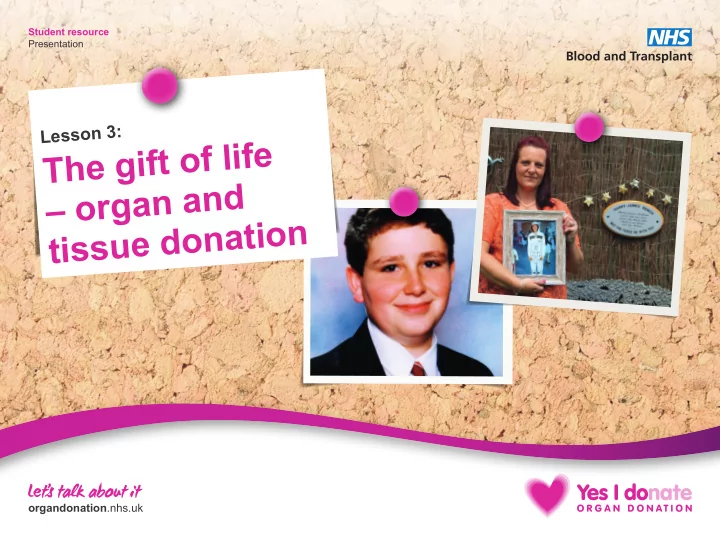

Student resource Presentation Lesson 3: The gift of life – organ and tissue donation organdonation .nhs.uk
Student resource Lesson 3: The gift of life – organ and tissue donation Presentation Lesson outcomes • To be able to describe what it might be like for a donor family • To be able to explain why organ and tissue donation is important • To be able to discuss organ and tissue donation from the perspective of difgerent religions. organdonation .nhs.uk 02
Student resource Lesson 3: The gift of life – organ and tissue donation Presentation Introductory activity h e t m r o f d s o r w e y k e r e h e t v G i last lesson and defjne them. List three organs that someone can donate. List three things you learnt in the last lesson – did anything surprise you? organdonation .nhs.uk 03
Student resource Lesson 3: The gift of life – organ and tissue donation Presentation Activity 1: Describe what it might feel like to be a donor family Task: Write your response to these questions on your activity sheets: • What do you think Philip’s parents were feeling when they heard the news of his accident? • What do you think Philip’s parents would be saying to support each other? • What do you think Philip’s parents would be saying to the Specialist Nurse in Organ Donation at this diffjcult time? • Are there any words that they used that surprise you? organdonation .nhs.uk 04
Student resource Lesson 3: The gift of life – organ and tissue donation Presentation Activity 1: Describe what it might feel like to be a donor family In pairs discuss this question: • How would you discuss organ and tissue donation with your family? organdonation .nhs.uk 05
Student resource Lesson 3: The gift of life – organ and tissue donation Presentation Activity 2: Explain why organ and tissue donation is important and why some families make the decision to donate a loved one’s organs and tissues Task: Watch the fjlm about Dawn Smith and her son Harry-James Kirkham which can be found at www.nhsbt.nhs.uk/teaching-resources . Answer the questions on your activity sheets. After watching the fjlm answer the following questions on your activity sheets: • Compare and discuss your answers with a partner. Did you agree or disagree with any of them? • Were there any parts of this story that surprised you? • Why do you think Dawn wanted to share her story with you? • How do you feel about organ and tissue donation after watching this fjlm? organdonation .nhs.uk 06
Student resource Lesson 3: The gift of life – organ and tissue donation Presentation Activity 3: Group discussion and presentation Task: “I’m thinking about joining the NHS Organ Donor Register, but is it alright for me to agree to my organs and tissues being donated after my death?” You will represent members from a particular faith group. A member of your community has come to you for advice and asked the question above. You will be given a Faith Fact Card from the student activity sheet. Use this information to prepare a three-minute presentation answering the question above from the perspective of your given faith group. organdonation .nhs.uk 07
Student resource Lesson 3: The gift of life – organ and tissue donation Presentation Activity 3: Group discussion and presentation – guidance Your presentation should include: • What is this particular faith group’s perspective on organ and tissue donation? • What could faith leaders in this community do to reassure people that organ and tissue donation is a personal choice? • How would you argue for and against organ and tissue donation? organdonation .nhs.uk 08
Student resource Lesson 3: The gift of life – organ and tissue donation Presentation Lesson summary • Organ and tissue donation is a personal choice. If you die in circumstances where donation is possible, your family will be approached about organ and tissue donation. So, if you want to be a donor, it is important to let them know to make it easier for them to support your decision • All major religions in the UK support the principles of organ and tissue donation • Honouring a loved one’s decision to donate their organs is often seen as an act of generosity, bravery and inspiration • Families who support their loved one’s decision to donate their organs and/or tissues often describe their experience as positive • Families of donors will often be told how their loved one’s organs and tissues have helped and supported another family. organdonation .nhs.uk 09
Student resource Lesson 3: The gift of life – organ and tissue donation Presentation Looking back on the lesson • Do you feel that you understand what it might be like for a donor family? • Do you feel that you understand difgerent religious perspectives on organ and tissue donation? • Do you think you’ll be more likely to talk to your family about organ and tissue donation now? • What were the main messages you took from this lesson? 1920 025 Presentation L3 April2019 organdonation .nhs.uk 10
Recommend
More recommend